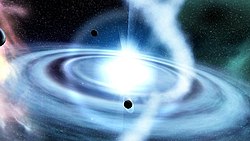
Back تشيبتون Arabic 8 bit Catalan Chiptune Czech Chiptune German Ĉiptuno Esperanto Chiptune Spanish چیپتیون Persian Chiptune Finnish Chiptune French צ'יפטיון HE
| Chiptune | |
|---|---|
 A musician's chiptune setup, involving Game Boy consoles | |
| Other names | |
| Stylistic origins | |
| Cultural origins | Late 1970s – early 1980s, Japan |
| Derivative forms | |
| Subgenres | |
| Bitpop | |
| Fusion genres | |
| Regional scenes | |
| Local scenes | |
| Other topics | |
| Artists | |
| Demoscene |
|---|
 |
| Concepts |
| Alternative demo platforms |
| Current parties |
| Websites |
| Magazines |
| Software |
| Electronic music |
|---|
| Experimental forms |
| Popular styles |
| Other topics |
Chiptune, also called 8-bit music, is a style of electronic music made using the programmable sound generator (PSG) sound chips or synthesizers in vintage arcade machines, computers and video game consoles.[11] The term is commonly used to refer to tracker format music using extremely basic and small samples that an old computer or console could produce (this is the original meaning of the term), as well as music that combines PSG sounds with modern musical styles.[12][13][14] It has been described as "an interpretation of many genres". Any existing song can be arranged in a chiptune style. It can be defined by choice of instrument, by timbre more than specific style elements.[15]
- ^ a b "How 8-bit music, or chiptune, moved from illicit origins to mainstream popularity". Australia: ABC News. August 9, 2019. Archived from the original on February 11, 2021. Retrieved February 15, 2021.
- ^ Limer, Eric (November 15, 2016). "Quit Wasting Time on Phone Games and Write Chiptunes Instead". Popular Mechanics. Archived from the original on December 6, 2022. Retrieved April 11, 2024.
- ^ Silver, Curtis (July 24, 2012). "Professor Shyguy Gives a Lesson in Chiptunes Pop Rock With Geekotica". Wired. Archived from the original on March 22, 2023. Retrieved April 11, 2024.
- ^ "Mandatory Metal Moments: The Ubiquity of Heavy Metal Culture in Video Games". online.ucpress.edu. doi:10.1525/jsmg.2023.4.2.24.
- ^ DJ Zobe (January 7, 2014). "The Asian Electronic Music Connection: Germany had Kraftwerk, Japan had Yellow Magic Orchestra". The Microscopic Giant. Archived from the original on May 26, 2021. Retrieved May 26, 2021.
- ^ Enis, Eli (October 27, 2020). "This is Hyperpop: A Genre Tag for Genre-less Music". Vice. Archived from the original on October 29, 2021. Retrieved January 4, 2021.
The PC Music sound is an undeniable influence on hyperpop, but the style also pulls heavily from rap of the cloud, emo and lo-fi trap variety, as well as flamboyant electronic genres like trance, dubstep and chiptune.
- ^ "Future Bass Music Gets a Kawaii Makeover". Anime News Network. Archived from the original on August 28, 2022. Retrieved May 4, 2021.
Last year's slowalk finds them shifting into more reflective territory, combining Books-style sampling with an assortment of bells, 8-bit blurps, and more sounds straight from the playroom.
- ^ Reformat the Planet (Motion picture). 2 Player Productions. March 2008.
- ^ Carnes, Aaron (December 12, 2016). "LA's Chiptune Scene Is More Than Just Nerds with Game Boys". Vice. Archived from the original on March 15, 2024. Retrieved March 15, 2024.
- ^ Jackson, Nate (July 1, 2011). "Saturday: Obsolete collective's monthly chiptune showcase in downtown L.A." Los Angeles Times. Retrieved June 7, 2024.
- ^ Kevin, Driscoll; Diaz, Joshua (2009). "Endless loop: A brief history of chiptunes". Transformative Works and Cultures. 2. doi:10.3983/twc.2009.0096. Archived from the original on May 25, 2015. Retrieved October 23, 2010.
- ^ "Trackerien tarina – modit soivat yhä" (PDF). Skrolli: 37. September 15, 2014. Archived (PDF) from the original on August 18, 2016. Retrieved August 30, 2015.
- ^ Friedman, Ian. "Top 5 Chiptune Artists". DJZ.com. Archived from the original on June 20, 2014. Retrieved March 13, 2012.
- ^ Houston, Niamh (November 4, 2014). "Music Made on Game Boys Is a Much Bigger Deal Than You'd Think". Archived from the original on June 22, 2020. Retrieved June 22, 2020.
- ^ Interactive Composition: Strategies Using Ableton Live and Max for Live. Oxford University Press. 2015. p. 159. ISBN 9780199973828. Archived from the original on May 30, 2024. Retrieved July 23, 2019.